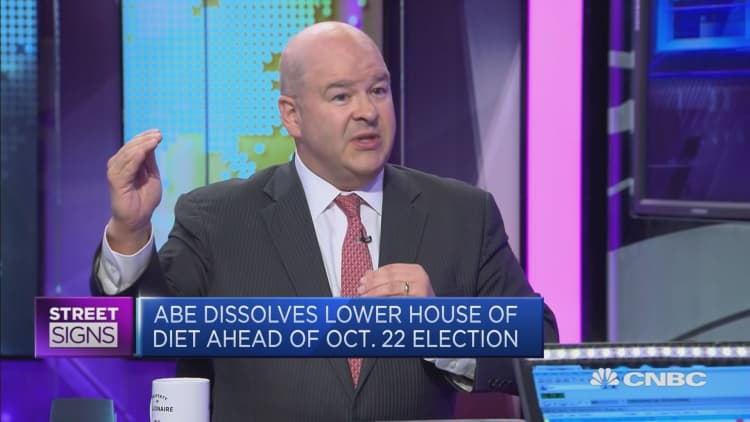Two of Japan's key political opposition vehicles combined on Thursday in a bold attempt to win power from Prime Minister Shinzo Abe's ruling Liberal Democratic Party at upcoming lower house elections.
It's a dramatic development for the world's third-largest economy, where a lack of strong resistance has characterized Abe's five-year reign.
While many still believe the current coalition government will retain its parliamentary majority at the Oct. 22 snap vote, the newly beefed up opposition could mar the prime minister's image, which is already vulnerable from a string of political scandals.
The Democratic Party, the LDP's main rival, disbanded on Thursday and united with newcomer Party of Hope in what marked "seismic tremors rippling through Japan's political scene," according to Scott Seaman, Asia director at political consultancy Eurasia Group.
Helmed by popular Tokyo Governor Yuriko Koike, Party of Hope was formally launched on Wednesday. It now has less than a month to muster a campaign and form a policy platform that sets it apart from the LDP. That could be challenging: Both parties are essentially conservative in nature.
That's triggered widespread doubt over whether Koike's faction will manage to upstage the LDP in next month's vote.
Hurting the LDP
But Koike's massive grassroots support base in Tokyo is likely to play to her advantage.
Koike, a former defense minister, has been making waves with her goals of abandoning nuclear power and halting national sales tax increases, with many commentators anticipating she will eventually become Japan's first female prime minister.
"Even if they don't get a big foothold across the country, they can really cut the LDP's number of seats and do Abe a lot of damage in Tokyo," Tobias Harris, Japan vice president at Teneo Intelligence, told CNBC on Friday.
Around 18 percent of voters nationally said they planned to support Koike's party, compared with 29 percent for the LDP, according to a recent survey by the Mainichi newspaper. A separate poll by the Asahi newspaper showed Party of Hope notching 13 percent and the LDP hitting 32 percent.
"The real threat that Koike poses to Abe is not that she might overthrow his coalition, but that her party might contribute to a large, embarrassing loss of the coalition's seats," said Seaman. "This, in turn, could fuel pressure on him to step down either immediately or derail his efforts to win a third term as LDP president next year."
Democratic Party weakness
The Party of Hope still faces pretty stiff headwinds.
Its chances could be stymied by the questionable legacy of the Democratic Party, which was in power from 2009 to 2012. "Koike is relying on defectors, or essentially a big block of candidates coming from the Democratic Party. That is a vulnerability," said Teneo Intelligence's Harris said.

During the 2012 general election, "the public gave up on [the Democratic Party] because they betrayed their 2009 campaign promises and mishandled crises," he explained. At the time, Abe accused the party of mismanaging the economy, warning that it could not be trusted with power.
Given the current risk-averse climate amid public fears over North Korean instability, the prime minister is expected to repeat that message, Harris said.
Lack of sufficient candidates
Another factor expected to hurt the Party of Hope is its size.
Koike "will likely not be able to field enough candidates in districts in the Tokyo metropolitan area and across the country to have a chance of capturing enough seats to break the coalition's majority," Eurasia Group's Seaman noted.
The Party of Hope is expected to produce over 100 candidates in total, but in light of the Oct. 10 deadline for nominations, "we are skeptical that Koike can move quickly enough to reach the goal that former Democratic Party member Goshi Hosono has set of running 200-plus candidates," Seaman said.

